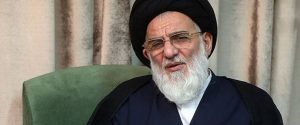In the midst of the political and security situation of the Iraq , the visit of Mahmoud Shahrudi, head of the council of Expediency discernment of the Iranian regime to Baghdad , comes in a series of meetings that seek to achieve the strategic goals and visions of Iran’s policy in Iraq and achieve a state of field alliance, which was extended for many years after the US occupation of Iraq and lay new foundations for the state of interaction and harmony among all the Shiite components that are supported by the Iranian regime, which sees them an ally in all common issues and concerns, especially since the political, economic and security compatibility between Iran and Iraq have become a key feature of the relationship between the two countries and Iraq has become an important and strategic depth for the Iranian policy and its objectives in the Arab region and the Middle East.
Hence comes the importance of choosing a religious and political figure in depth and the relationship of Shahrudi with the Iranian political decision makers and his proximity to the Iranian Supreme Leader Ali Khamenei, and to shed light on the importance of this visit, and its significance, depth and future prospects , we identify the following goals:
1.The political situation among all Shiite parties, parties and blocs has been marked by a state of the difference in political visions to deal with current events in Iraq now as reflected negatively on their positions and their relationship to each other noting that the deep differences have become an escalating phenomenon within the National Alliance and a state of division and fragmentation witnessed by many of these political parties and blocs so it comes the exit of Ammar al-Hakim from the leadership of the Iraqi Islamic Council to form a political movement called ( National wisdom movement- Al-Hikmah) which form a departure from the political architecture that Iran has tightened its control over it noting that the Supreme Council of the Islamic revolution in Iraq was founded in 1981 and was supervised by Shahrudi and then Muhammad Baqir al-Hakim became responsible for it and it has received considerable support from the Iranian regime as the first political formation to be announced with the beginning of the Iran-Iraq war and its launch was from Tehran.
That is why Iran has sought to attempt to encircle this dispute and interfere with it, but did not succeed despite the announcement and political response by Ammar al-Hakim and his announcement that he can not dispense with guidance and advice of Ali Khamenei, and whoever bet on disturbing this relationship , he is in an illusion .
2. Iran fears that its influence in Iraq will diminish and sees the rise of differences between its allies in Baghdad the beginning of the process of lack of control over the capabilities of political matters in Iraq and control in guiding the leaders of the National Alliance and therefore it is seeking to start in the process of dialogue with these leaders to begin the formation of a new Shiite political alliances that it could lead to the unification of coming political views and attitudes and keep a clear impact on the Shiite political situation in Iraq.
3.One of the most important political ambitions and strategic objectives of Iran in Iraq is to find (a unified Shiite coalition) works for political vision and field ideas and under the supervision and support by the actors in the political decision of Iran, because this issue is an important depth that Iran is seeking to maintain it and considering Iraq as the main crossing for its ambitions in the Arab region and thus a state of split leads to the weakening of this goal and could be fading in the future, as it seeks to hold Shiite politicians to preserve the principle of unity and solidarity among them.
4.The visit comes after the Arab political orientation by many Arab countries, led by Saudi Arabia in the meeting and dialogue with political and religious leaders in Iraq, including visits by the leader of Sadr movement to Riyadh and Abu Dhabi and his meeting with its political leaders, Iran saw it as an Arab activity seeks to undermine its objectives in Iraq and here the leadership of the Sadrist movement and the Ahrar bloc have understood this Iranian concept so it did not meet with Shahrudi, but a spokesman for the Ahrar bloc Amir Kanani announced that Shahrudi bears sectarian projects targeting Iraq, and that Iran is interfering in Iraqi affairs in the way that it is not in the interest of his people by pushing toward sectarian ditching .
5. The ideological and sectarian concept brought by Shahrudi and announced its title (building the Iraqi generations ideologically) This means that Iran is stuck to the adoption of the sectarian aspect as a central basis in Iraq and establishment of political and ideological structure aimed at weakening the unity of Iraq and to stick to the projects and goals of Iran, which seeks to keep Iraq a way from its Arab and Islamic environment and its influence planting the case of the dispute and division between its people and work to break up and thwart any national political project and Iraqi orientation working on the unity of the country and a cross-sectarian project.
The Iraqi Studies Unit
Rawabet Center for Research and Strategic Studies

